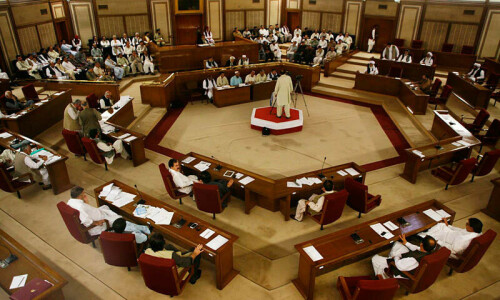THE decision of the Council of Common Interests to constitute a committee to “look into the issue of fair distribution of water among the provinces” recognises the inherent weaknesses and inadequacies of the Water Apportionment Accord signed back in 1991. Often hailed as a landmark agreement on the distribution of the waters of the Indus River System among the provinces, the accord lacks a clear objective. If the purpose, as is widely accepted, was to resolve the long-standing interprovincial disputes — particularly between Punjab and Sindh — on the sharing of waters, it has utterly failed to do its job. Some would go so far as to blame the accord for having accentuated tensions between the two provinces in its nearly three decades of operation. The ambiguities in the provisions of the agreement, according to numerous research studies carried out by experts, also let the stakeholders interpret the document variously to suit their own interests and perspectives.
The agreement assumes that 117.35MAF of water will be available in the system for allocation to the provinces according to their share agreed under the accord. But in reality the actual system supplies have always been much lower than the assumed volumes. More problematic is the ambiguity or lack of a clearly defined mechanism for sharing the shortages — the differential between the assumed and actual volumes in the system. The provision that the record of the actual average system uses for the period between 1977 and 1982 would form the basis for sharing water shortages and surpluses has intensified the dispute between Punjab and Sindh, instead of ending it. Punjab remains adamant on interprovincial water distribution on the basis of historical uses. However, Sindh insists on the allocation of its share on the basis of the supplies assumed in the accord. Sadly, Irsa, which oversees the operation of the water accord, is not seen as an impartial arbitrator and, for various reasons, has failed to resolve the disputes over the formula for sharing the shortages. The formation of the CCI committee has spawned hopes that the centre and the provinces are now ready to discuss the contentious provisions of the accord and tackle them sooner than later. In spite of its shortcomings and ambiguities, the water accord is considered an important milestone towards the resolution of interprovincial tensions over the water-sharing mechanism. The CCI committee needs to only bring clarity to the vague stipulations of the agreement.
Published in Dawn, August 8th, 2020











































Dear visitor, the comments section is undergoing an overhaul and will return soon.